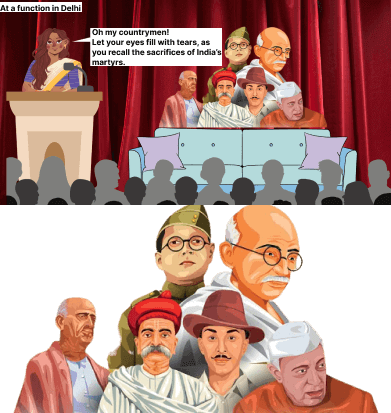Class 8 English Honeydew Chapter 3 Questions and Answers - Free PDF Download
FAQs on NCERT Solutions For Class 8 English Honeydew Chapter 3 Glimpses Of The Past (2025-26)
1. What are NCERT Solutions for Class 8 English Chapter 3 'Glimpses of the Past' as per the latest CBSE 2025–26 syllabus?
NCERT Solutions for Class 8 English Chapter 3 'Glimpses of the Past' provide stepwise, syllabus-aligned answers to all textbook questions. These solutions follow the CBSE 2025–26 guidelines and help students master concepts, improve answer presentation, and prepare effectively for exams.
2. How should students write answers for Class 8 English Chapter 3 Glimpses of the Past in NCERT exams?
Students should:
- Read the full question carefully from NCERT Solutions for Class 8 English Chapter 3.
- Use a stepwise approach and direct language as modeled in Vedantu's expert-verified solutions.
- Include textual examples, character names, and historical context where relevant.
3. What is the main theme addressed in Class 8 English Chapter 3 Glimpses of the Past NCERT Solutions?
The main theme is the emergence of Indian resistance to British rule, highlighting the impact of colonial policies, social issues, and key reformers. NCERT Solutions explain these events using structured, easy-to-understand answers aligned to student level.
4. Why were Indian artisans mentioned in Class 8 English Chapter 3 NCERT Solutions, and what did they suffer?
Indian artisans faced high taxes, loss of livelihood, and suppression by the British. According to NCERT Solutions, British policies like free market competition and import of English goods led to the decline of traditional Indian industries, which is a core topic for CBSE 2025–26 exams.
5. How did the British East India Company subdue Indian princes, as per Class 8 English NCERT Solutions Chapter 3?
The NCERT Solutions clarify that the Company took advantage of internal conflicts among Indian rulers, offering military support and then gradually gaining control through treaties, deception, and superior resources, which contributed to the loss of sovereignty.
6. What are some FUQ (Frequently Unasked Questions) students must know for NCERT Solutions for Class 8 English Chapter 3?
Examples include:
- Why did Raja Ram Mohan Roy support modern education in his reform efforts?
- What if the Indian princes had united against the British — how might history have changed?
- How did the social reforms impact the freedom movement, according to NCERT Solutions?
7. What types of social issues are highlighted in NCERT Solutions for Class 8 English Chapter 3?
Class 8 English Chapter 3 NCERT Solutions address:
- Practices like Sati, child marriage, and untouchability
- The caste system and its social impact
- Efforts by reformers to abolish these issues
8. How do symbols like chapatis and lotus flowers feature in Class 8 English Chapter 3 NCERT Solutions?
According to NCERT Solutions, chapatis and lotuses were symbolic objects circulated to unite Indians in warning and mobilization against British rule, fostering communication and collective action during the resistance period.
9. What is Regulation III Act of 1818 as described in NCERT Solutions Class 8 English Chapter 3?
NCERT Solutions explain Regulation III Act of 1818 as a law allowing the British to jail Indians without trial—an example of oppressive colonial policies covered in exam-oriented answers.
10. How do the NCERT Solutions for Class 8 English Chapter 3 help improve answer writing for CBSE exams?
NCERT Solutions guide students to:
- Frame precise, point-wise answers
- Include accurate references from the text
- Present information logically, as preferred in CBSE marking schemes
11. What role did Raja Ram Mohan Roy play in ‘Glimpses of the Past’ as emphasized in NCERT Solutions?
According to NCERT Solutions, Raja Ram Mohan Roy was a key reformer who founded the Brahmo Samaj, opposed Sati and child marriage, and advocated for modern education and social equality—central to CBSE exam questions on this chapter.
12. How should students approach indirect speech questions in Class 8 English Chapter 3 as per NCERT Solutions?
Students should:
- Identify the reporting verb and subject
- Transform statements from direct to indirect speech following CBSE grammatical rules
- Check tense consistency and pronoun changes
13. What values are highlighted in Glimpses of the Past Class 8 as per NCERT Solutions?
NCERT Solutions emphasize values such as unity, resilience, courage, equality, and patriotism—all of which are important for understanding the historical context and answering application-based CBSE questions.
14. How do NCERT Solutions for Class 8 English Chapter 3 explain the reasons for the 1857 War of Independence?
The Solutions outline key reasons:
- Oppressive British policies
- Socio-religious reforms
- Economic exploitation
- Discontent among soldiers and civilians
15. In what ways can stepwise NCERT Solutions for Class 8 English Chapter 3 help in concept retention?
Stepwise NCERT Solutions:
- Break complex historical events into manageable steps
- Use simple explanations and examples
- Enable students to recall key facts, causes, and effects as needed in exams


























